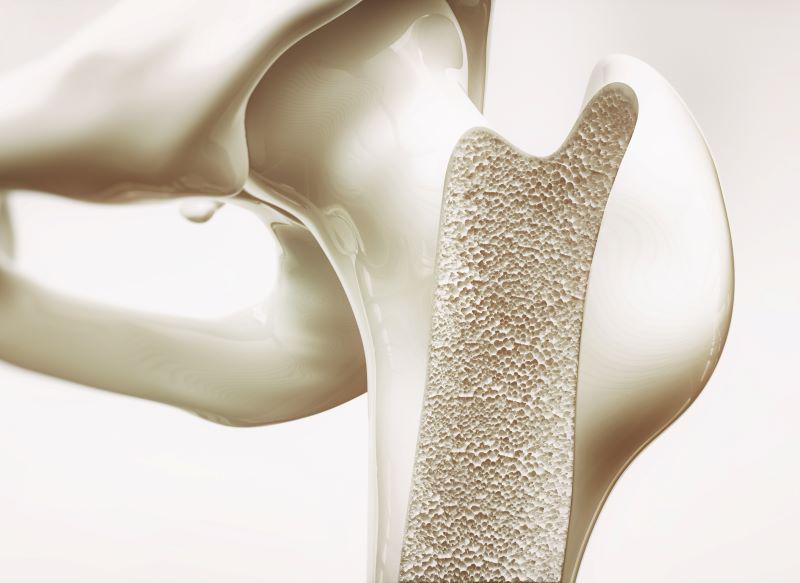Get Healthy!

- Daniel Wiznia, MD, Assistant Professor of Orthopaedics and Co-lead, Avascular Necrosis Program, Yale
- Posted May 31, 2023
What Is Avascular Necrosis and How Does It Affect Bones?
What happens when the blood supply to your bones is somehow damaged?
The condition has a name, avascular necrosis, and it can trigger the death of bone cells.
Other common names are osteonecrosis or bone infarction. Bone is alive and requires nourishment from the blood supply to stay healthy. If the blood supply is not restored to the bone, small cracks develop and the bone can fracture and collapse. Avascular necrosis commonly occurs in the hips, knees, shoulders, elbows and ankles.
Causes and risk factors
Avascular necrosis is caused by injury to the small blood vessels around joints. These injuries can include trauma to the joint, such as a dislocation of the joint or fracture of the surrounding bone. Other causes of injury to the blood supply include high-dose steroids that are commonly used to treat rheumatologic or lung conditions, excessive alcohol use, or medical conditions that impact small blood vessels.
Risk factors for avascular necrosis include trauma, high-dose corticosteroids, alcohol, sickle cell disease, HIV, a history of cancer requiring radiation to the joint, chemotherapy, blood-clotting disorders, rheumatologic conditions and COVID-19.
Patients of all ages may suffer from avascular necrosis, so it's important to not ignore symptoms so that the bone can be treated before the joint collapses.
Symptoms
Patients may initially present without any symptoms (avascular necrosis may have been found incidentally during an X-ray, CT scan or MRI for another medical concern), with low-grade joint pain or with severe pain. An initial workup for joint pain usually starts with X-rays, but in the early stages avascular necrosis may not be seen on an X-ray. If symptoms do not improve, an MRI or a CT scan are required. Even if the pain is very mild, persistent pain that does not improve requires higher-level imaging (MRI or CT). A patient's level of pain does not always reflect their severity of avascular necrosis, whether the joint has begun to collapse or if there is cartilage damage.
Treatments
There are many medical and surgical treatments for avascular necrosis. As the severity of avascular necrosis increases, patients may require surgical options.
For cases in which the joint has not collapsed, patients can explore nonsurgical treatment options, such as a medication class of bone-building drugs called bisphosphonates. Patients with a known blood-clotting disorder or vascular disease should take medication to address those conditions (blood thinners or cholesterol-lowering medication). Pain can be treated with over-the-counter medication (check with your doctor before starting), such as acetaminophen or nonsteroidal anti-inflammatory drugs. However, these medications don't cure avascular necrosis and joint collapse is still a risk.
In terms of surgical options, core decompression is a common procedure in which a surgeon removes cores of dead bone. They may also replace these cores with new healthy bone to stimulate new vessel regeneration and bone growth. There are new techniques being developed to improve the quality and outcome of core decompression surgery, such as 3D-aiming technologies and the use of stem cells. Some centers, including Yale Medicine's Avascular Necrosis & Osteonecrosis Program where I work, also recommend hyperbaric oxygen treatments to improve the regenerative potential of stem cells. The goal of these treatments is to lower the risk of bone collapse and the need for a joint replacement.
Unfortunately, once the round smooth shape of the joint collapses, patients will require joint replacement surgery. While patients do well with joint replacement surgery in general, there are potential complications, such as failure of the implants, infection and fractures around the components.
How long can you live with avascular necrosis?
Most patients with avascular necrosis will not see a decrease in their life span, as they are able to recover from surgeries and return to their daily activities. However, there are a subset of patients who have underlying medical conditions which increase their risk of avascular necrosis, and if these conditions are not treated, patients may experience a decreased quality of life.







